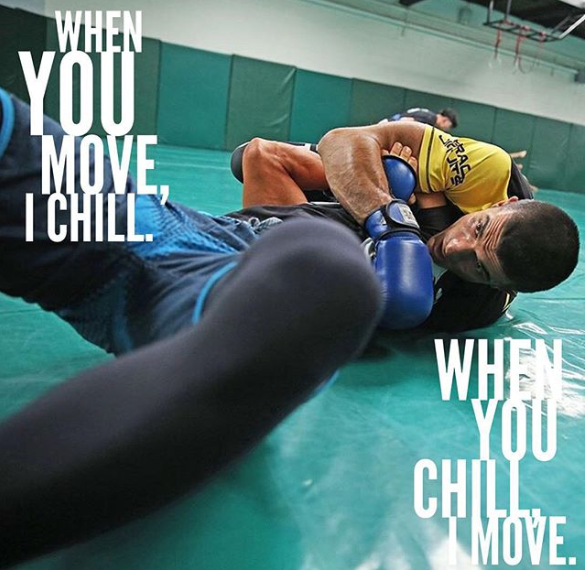In Jiu Jitsu – Don’t trust your instinct
When you watch people using jiu-jitsu, you may see a lot of holds, chokes, and the occasional strike, but at its core jiu-jitsu is a technique of self-defense. The theory underlying this technique is based on conserving energy, waiting for your opponent to make a mistake, and most importantly survival. This obviously requires patience, but it also means you need to feel comfortable in a defensive position so that you can weather the storm of your opponent’s offensive without panicking and slipping up.
Instinct Is Not Always the Best Guide
All people feel the urge to get out of dangerous situations. It’s a survival instinct that gets activated whether we’re in a street fight situation or a tournament-style competition. It’s the alarm bells of our lizard brains telling us that it’s time for fight or flight. While this instinct is no doubt important, it is not informed by any real strategy. It is going to tell you to panic and flail around in the hope that you can break free.

This is not going to be effective against an opponent who is in a dominant position and has a better jiu-jitsu technique than you or is stronger than you. They will be able to prevent you from escaping no matter how much you thrash around. Eventually, you are going to exhaust yourself and there the fight will end.
Survival As Your Guide
As Ryron Gracie of Gracie University notes in the below video, pushing yourself to escape during a jiu-jitsu match doesn’t just mean you’re wasting energy; it also makes it more likely that you’ll make a mistake and to get tapped out. If you remain on the defensive, if you remain patient and observant, you’re less likely to slip up. More importantly, you’re more likely to give yourself time to recognize your opponent’s strategy and to use your training and knowledge of jiu-jitsu to escape.
The Universal Misunderstanding
This brings up a larger question that Ryron poses. In jiu-jitsu, should your focus be submitting your opponent or avoiding submission? For him, the answer is the second one. Because jiu-jitsu is at its core a form of self-defense, the goal should be survival and avoiding submission. Forcing a submission is secondary. According to Ryron, the opposite kind of thinking leads to what he calls “the universal misunderstanding.”
When your primary goal is to not be defeated, you expend your energy differently. Similarly, when your focus is on doing whatever keeps you the safest rather than overextending yourself while trying to get your opponent to tap out, this changes your strategy. In a street fight setting or during a match that does have time limits, this means you can stay safe, conserve your energy, and only go on the offensive when you see a clear opening. If you end up on the defensive, be patient, stay aware, and wait for your opponent to attempt to make their move. “When your opponent on top of you changes from control to offense, they loosen up their control,” Ryron says. This gives you a window where you can escape.
In a street fight, the same principle applies. If they want to submit you, they will eventually have to switch from trying to hold you down to trying put you in submission or to knock you out. Being able to recognize this transition can mean the difference between a clean escape and a lost fight.
Keep It Playful
Of course, being patient when your opponent is in the dominant position isn’t your first instinct, and it can be hard to tune out your lizard brain, which is telling you to do anything to escape. However, if you prepare yourself for this scenario and become accustomed to being on the defensive, you can learn to use your jiu-jitsu in a methodical and strategic way. According to the Gracie method, the way to do this is to keep it playful when you’re training with your partner.
This phrase means you invite your training partner to attack you. You let them mount you. You let them tap you out.
This may sound counterintuitive and strange, especially if you’ve trained in a gym where fighters are encouraged to always go 100%. However, what you’re doing is gaining a greater understanding of the potential ways that you can be tapped out during a real fight. When you keep it playful, you keep in mind that sparring is just a training exercise and that you are training for a time when it matters most to you and especially when you are in real danger. You learn how to improve your timing and how to recognize when you will have a clear opportunity to escape rather than trying several times and draining your energy.
By keeping it and allowing yourself to fail during the simulation, you learn how to better defend yourself when you are in a situation where you cannot lose.

